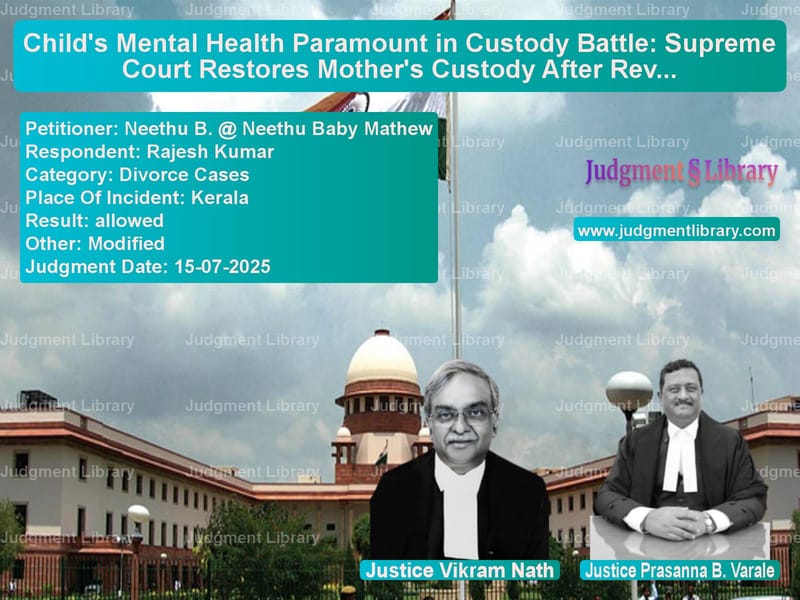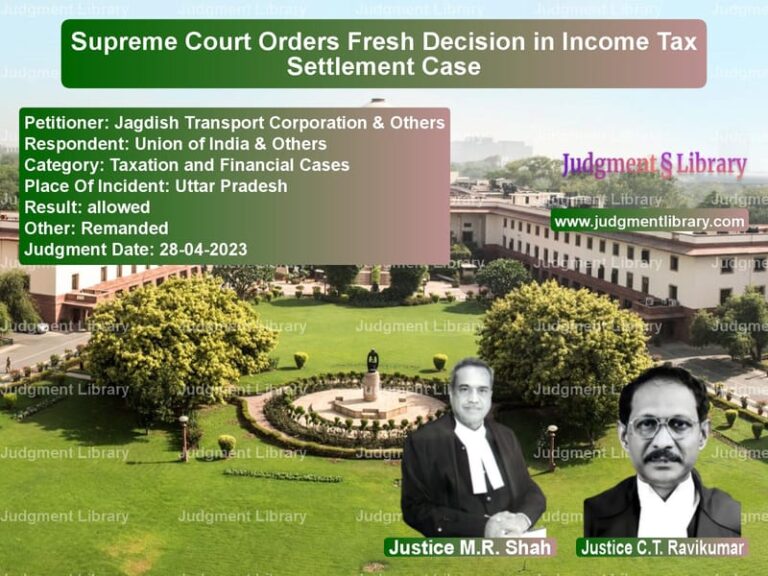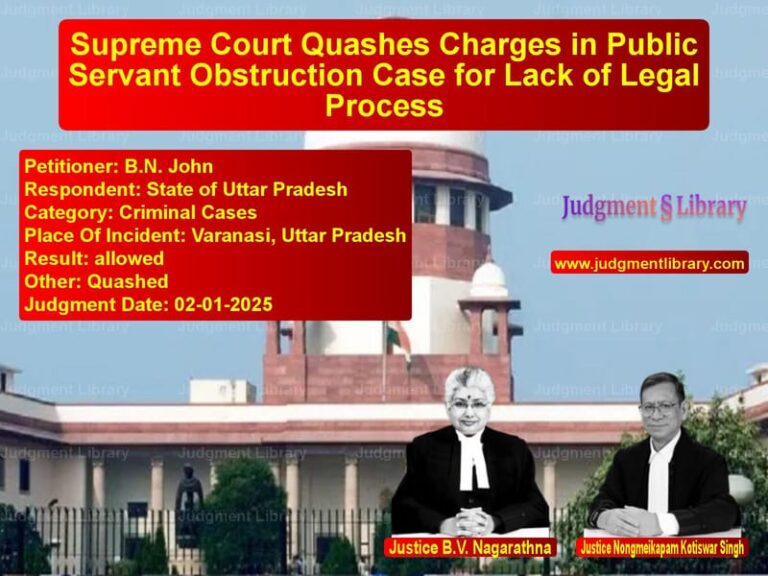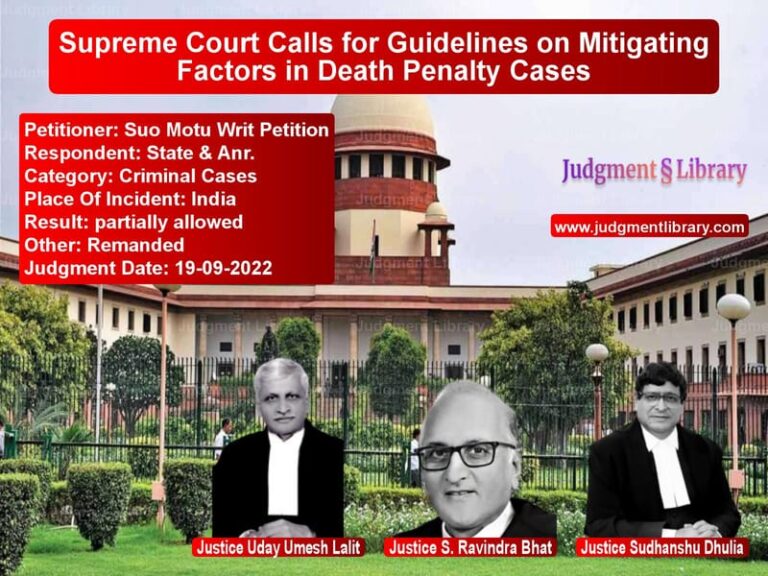Child’s Mental Health Paramount in Custody Battle: Supreme Court Restores Mother’s Custody After Review
In a landmark judgment that places children’s mental health and emotional well-being at the forefront of custody disputes, the Supreme Court has taken the extraordinary step of reviewing its own decision to restore a child to his mother’s custody. The case of Neethu B. @ Neethu Baby Mathew versus Rajesh Kumar represents a significant development in family law, demonstrating how courts must remain responsive to the evolving needs and psychological states of children caught in custody battles.
The story begins with the marriage between Neethu and Rajesh, solemnized on September 4, 2011, according to Hindu rites and rituals. Their union produced a son born on November 7, 2012. However, marital harmony was short-lived, and the couple began living separately from October 22, 2013. They eventually decided to dissolve their marriage by mutual consent, executing an agreement on September 13, 2014, that outlined divorce terms and custody arrangements for their minor child. As per this agreement, custody remained with Neethu, while Rajesh received visitation rights on two Saturdays each month. The Family Court in Attingal, Kerala, formalized this arrangement on June 26, 2015.
Life moved forward for Neethu, who remarried Handel Thomas on August 18, 2016. Thomas had two children from his previous marriage, both now adults, and Neethu subsequently had another child with him. The family resided in Thiruvananthapuram, creating what appeared to be a stable home environment for Neethu’s son from her first marriage.
According to Rajesh’s account, he remained unaware of Neethu and his son’s whereabouts between 2016 and 2019, despite his efforts to locate them. The situation changed in October 2019 when Neethu contacted Rajesh to obtain his signatures on affidits needed for their son’s international travel documents. Through this contact, Rajesh learned about Neethu’s remarriage and her plans to relocate to Malaysia, where her new husband had secured employment as a Senior Manager in a multinational company. Rajesh also discovered that their son’s religion had been changed from Hindu to Christian without his knowledge or consent.
These developments prompted Rajesh to file OP(G&W) No. 2353/2020 before the Family Court in Thiruvananthapuram, seeking permanent custody of his son. The case was later transferred to the Family Court in Ottapalam at Neethu’s instance. She filed a counterclaim seeking permission to take their son abroad to rejoin her husband.
The Trial Court, in its judgment dated October 31, 2022, rejected Rajesh’s request for custody, instead granting permanent custody and guardianship to Neethu while extending visitation rights to Rajesh. The court allowed Neethu to take the child abroad during specific holiday periods, subject to providing detailed information about their travel plans.
Both parties appealed this decision to the High Court, which delivered a significant reversal on October 17, 2023. The High Court granted permanent custody to Rajesh while providing Neethu with virtual visitation rights every alternative day and physical visitation rights during half of the school holidays, whenever she visited India. The court based this decision on its assessment that relocating the child to Malaysia would not serve his best interests, given his established life in India.
Neethu challenged this decision before the Supreme Court through special leave petitions, which were converted to Civil Appeal Nos. 5395-5396 of 2024. The Supreme Court initially dismissed these appeals on August 22, 2024, effectively confirming the High Court’s order granting permanent custody to Rajesh.
What followed was unprecedented. Neethu filed review petitions against the Supreme Court’s dismissal, primarily arguing that the impending separation from his mother had severely impacted their son’s mental health. She supported this claim with a Clinical Psychologist’s Report dated September 3, 2024, which revealed the child was experiencing anxiety and fears, with a high risk for separation anxiety disorder. Neethu also alleged that Rajesh had made threatening remarks to the child about permanent separation from his mother, further exacerbating the psychological distress.
The Supreme Court, acknowledging the extraordinary nature of review petitions, carefully examined whether the case met the established criteria for such intervention. The Court noted that ‘the normal principle is that a judgment pronounced by this Court is final, and departure from that principle is justified only when circumstances of a substantial and compelling character make it necessary to do so.’ The Court referenced its earlier decision in Kamlesh Verma v. Mayawati, which outlined when review petitions would be maintainable, including ‘discovery of new and important matter or evidence which, after the exercise of due diligence, was not within knowledge of the petitioner or could not be produced by him’ and ‘any other sufficient reason.’
The Court further elaborated on the ‘triple test’ from State of West Bengal & Ors. v. Kamal Sengupta & Ors., requiring satisfaction that: ‘(i) new matter/evidence discovered is of such nature which could change the judgment (ii) such new matter/evidence was not within the knowledge of the party seeking review (iii) same could not be produced before court even after due diligence.’
Ms. Liz Mathew, learned senior counsel appearing for Neethu, argued that ‘the instant petitions have been filed solely in the paramount interest of the child as the judicial verdict in favour of change of custody has caused a drastic impact on the mental health of the child which may seriously affect him during his formative years and can potentially be irreversible if due regard is not exhibited in time.’ She emphasized that the child had been in Neethu’s exclusive care since the couple separated in October 2013, when the child was just eleven months old, and had never spent a night apart from his mother with Rajesh.
The psychological assessment from Christian Medical College, Vellore, continued during the review petition proceedings, producing four reports dated September 3, 2024, October 19, 2024, January 7, 2025, and March 29, 2025. All reports consistently indicated the child was experiencing significant anxiety, difficulty coping with emotions, and separation anxiety due to the looming custody change. The medical professionals strongly recommended maintaining stability and avoiding disruption to the child’s existing support systems.
On the other side, Ms. Kiran Suri, learned Senior Counsel for Rajesh, contended that the case didn’t meet the parameters for review jurisdiction. She argued that the psychological reports relied on information provided by Neethu and her husband and couldn’t be independently verified. She also asserted that Neethu had intentionally withheld information about the child’s whereabouts from August 2016 to October 2019, preventing Rajesh from maintaining regular contact. Rajesh, a government servant who hadn’t remarried, argued he could provide a stable and financially secure environment for the child.
The Supreme Court, after extensive consideration, found that ‘the child’s deteriorating mental health as a consequence of judicial order changing custody is a new development and a direct consequence of dismissal of appeals by this Court.’ The Court determined that the psychological assessment reports constituted new evidence that wasn’t available during the original appeal hearing and directly impacted the child’s welfare, thus meeting the criteria for review.
The Court’s analysis revealed several crucial factors. The child, now twelve years old, had been in Neethu’s exclusive care since infancy and viewed her as his primary caregiver and source of comfort. He had also formed strong bonds with his stepfather, who had been part of his life since preschool, and his half-brother. The Court observed that ‘the minor child recognizes his mother, half-brother and stepfather to be his immediate family and feels utterly secure in that setting.’
The Court acknowledged that while the High Court’s original custody decision aimed to prevent uprooting the child from Kerala, the psychological reports made ‘it absolutely clear that the minor’s normative universe comprises his current family setting, primarily and especially involving his mother who has been the child’s sole caregiver for the past eleven years.’ The Court emphasized that ‘the stability and security of the child is an essential ingredient for the full development of the child’s talent and personality,’ and that expecting the child to abruptly adjust to an unfamiliar household with a father who remained ‘akin to a stranger’ would be ‘extremely harsh and insensitive.’
While restoring permanent custody to Neethu, the Court also recognized Rajesh’s legitimate desire to be involved in his son’s life. The judgment establishes a detailed visitation arrangement, including virtual interactions twice weekly and in-person visits every weekend from 10 a.m. to 5 p.m. The Court imposed restrictions on Neethu’s ability to relocate abroad with the child and mandated continued psychological assessment and counseling, with Rajesh’s participation encouraged.
The Court offered wise counsel to both parents, reminding them that ‘the parties are advised not to let their bitter past experience impede the child’s well-being, especially given the sensitive emotional state of the tender child.’ Specifically addressing Rajesh, the Court noted that ‘a father-son relation can only be fostered patiently over the course of years, marked by his continued presence and responsibility-bearing attitude, and nurtured with boundless love, care and empathy.’
This judgment represents a significant evolution in how courts approach child custody matters, demonstrating that children’s mental health and emotional well-being can constitute compelling grounds for reviewing even final decisions. It reaffirms that in custody disputes, the child’s welfare remains the paramount consideration, and courts must remain responsive to developments that affect this fundamental principle, even if it means revisiting their own final judgments.
Petitioner Name: Neethu B. @ Neethu Baby Mathew.Respondent Name: Rajesh Kumar.Judgment By: Justice Vikram Nath, Justice Prasanna B. Varale.Place Of Incident: Kerala.Judgment Date: 15-07-2025.Result: allowed.
Don’t miss out on the full details! Download the complete judgment in PDF format below and gain valuable insights instantly!
Download Judgment: neethu-b.-@-neethu-b-vs-rajesh-kumar-supreme-court-of-india-judgment-dated-15-07-2025.pdf
Directly Download Judgment: Directly download this Judgment
See all petitions in Child Custody
See all petitions in Alimony and Maintenance
See all petitions in Domestic Violence
See all petitions in Mutual Consent Divorce
See all petitions in Property Division in Divorce Cases
See all petitions in Judgment by Vikram Nath
See all petitions in Judgment by Prasanna Bhalachandra Varale
See all petitions in allowed
See all petitions in Modified
See all petitions in supreme court of India judgments July 2025
See all petitions in 2025 judgments
See all posts in Divorce Cases Category
See all allowed petitions in Divorce Cases Category
See all Dismissed petitions in Divorce Cases Category
See all partially allowed petitions in Divorce Cases Category







